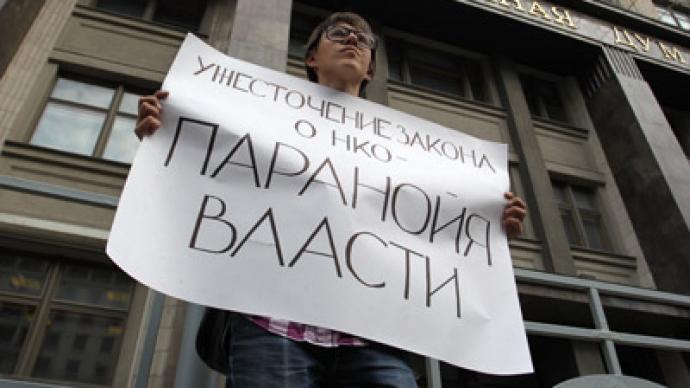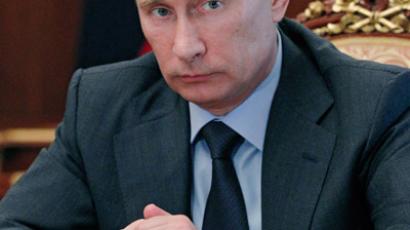‘Foreign agents’ bill may target all Russians, critics say

Given the newly adopted law on NGOs and a plan to label media outlets funded from abroad foreign agents, every Russian citizen may end up having such status, believes the head of the Presidential HR Council.
“I’m afraid we’ll get into a weird situation when there will be only foreign agents left,” the Council chief Mikhail Fedotov told Interfax. The comment referred to the bill – recently approved by parliament – that grants the status of a foreign agent to externally-funded non-profit organizations involved in political activities. In the autumn, the ruling United Russia party plans to consider amendments to the law On Mass Media that would provide for the same label to Russian media financed from outside the country.Fedotov pointed out that “it’s rather strange to equate mass media to non-profit organizations since the majority of media outlets are commercial companies.” So, he noted, if any company sells its products abroad “it automatically becomes a foreign agent.” In his view, it is a lot more important to provide for transparency of mass media funding, no matter whether it comes from abroad or not. “Unfortunately, our media tycoons are not very fond of transparency,” the chief human rights advisor admitted.On Wednesday, a draft law obliging Russian media outlets to declare if they receive funding or grants from abroad was submitted to the State Duma. “This bill has been proposed as a continuation of the work we started, having passed the bill on NGOs-foreign agents," said the author of the initiative, United Russia’s MP Yevgeny Fyodorov. Foreign money sponsors the manipulation in the political space not only through NGOs, “but also – and maybe even to a greater extent – through the mass media,” the lawmaker pointed out. He stressed though that labeling such media outlets a foreign agent “is not a matter of banning, but a matter of notification.” Some political analysts agree the suggested initiative would not pose a threat to the freedom of speech. According to Sergey Markov, “it is no secret” that a number of “foreign centers” have decided to create a color revolution scenario in Russia. In an attempt to fulfill their plans, they are using NGOs and the media. “Activities of all forces involved in politics – including mass media – must be transparent,” he told Interfax. Vyacheslav Nikonov, president of the Politika Foundation in Moscow and United Russia’s deputy, also believes the bill not lead to any pressure on the media. “Media outlets receiving foreign funding would simply have to openly say about that,” he explained. Meanwhile, Ilya Ponomaryov – a member of the Fair Russia party, which boycotted the Duma voting on the NGOs bill – is working on a draft law granting the same status for officials who keep over a half of their savings in foreign banks. He suggests carrying out a check on such people in order to see if they work in the interests of a foreign state, or, if their relatives “are spies.” Such a bill would “definitely” serve as a defense from foreign influence, he noted in his blog on the internet.As for the adopted legislation on the NGOs, “it’s absolutely propagandistic” and only aimed at undermining citizens’ trust towards non-profit organizations, Ponomaryov stated. Several recent Russian legislative initiatives – including the so-called anti-rally bill, a bill toughening punishment for libel, and the laws imposing greater government control over internet and nonprofits – have raised concerns outside the country. "It is very disappointing that laws restricting civil society are being passed, instead of those designed to create an environment that would help civil society enhance human rights promotion and protection," said UN High Commissioner for Human Rights Navi Pillay. Moscow hit back saying that the change of laws "is a prerogative of the legislative branch of a sovereign state” and foreign interference into the process “is inadmissible."“We were perplexed by Pillay's attempts to publicly meddle in the Russian legislative process," the Foreign Ministry’s spokesman Alexander Lukashevich stated on Wednesday. The diplomat expressed hope that in the future she would “refrain from making politically motivated and incorrect statements, which do not correspond to constructive interaction between the Russian Federation and the Office of the UN High Commissioner for Human Rights."














